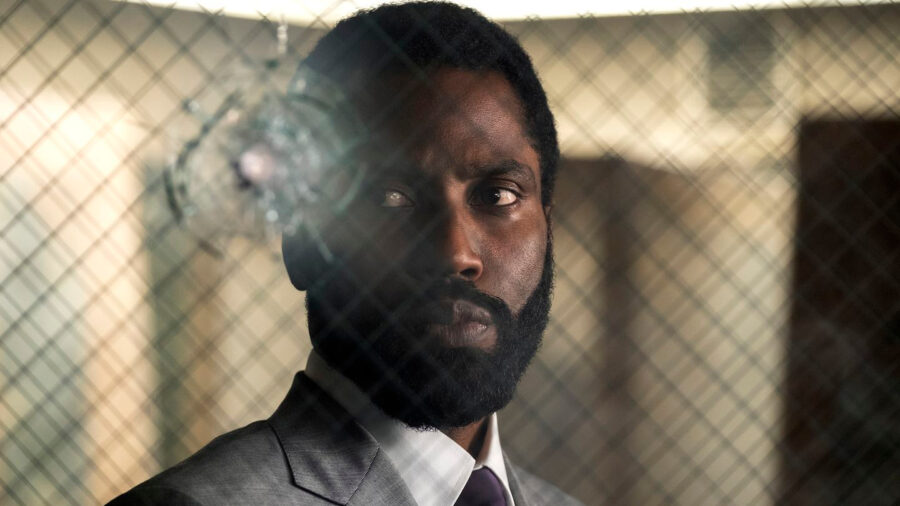Tenet Review: Christopher Nolan’s Beautiful, Boring Science Project
Tenet is a movie that has so much meta-narrative surrounding it at this point. There is a contingent of Christopher Nolan fans who will bring their undying love of the director's body of work to the table.
This article is more than 2 years old

Tenet is a movie that has so much meta-narrative surrounding it at this point. There is a contingent of Christopher Nolan fans who will bring their undying love of the director’s body of work to the table. You have the topic of original big-budget entertainment being made for adults that influences the conversation. Above all, it is impossible to ignore the discussion about the current pandemic, the state of the film exhibition industry, and how Nolan’s film is being positioned as a savior for the normalcy of the movie-going experience.
All of this is going to create so many different perspectives from which people will view Tenet. A number of those takes will likely be in bad faith and attached to agendas that don’t really have to do with the film itself. Whether it’s wrapping up your political feelings with the film’s release or your overall feelings about Nolan as an artist and/or a public figure, it is going to be very difficult to separate so much outside noise from what Tenet is on its own.
Because when you strip away all of the external interference from the discussion and just drop Tenet under a spotlight, the conclusion is far less stimulating and complex than the rest of the discourse surrounding it.
Yes, Tenet is not a great movie. In fact, it’s not even a good one.

Christopher Nolan has proven himself to be one of our most meticulous and extravagant directors. What has endeared him to many cinephiles is the perceived cerebral quality he brings to a lot of his projects, and he certainly has demonstrated that quality well in his magnum opus, Inception. However, Tenet is another example (along with Interstellar) that this “big brain” narrative surrounding Nolan isn’t as crystalline as it seems. Sometimes, Nolan wants to do cool things for a much simpler reason: because they are cool.
And don’t misunderstand me: there is cool stuff in Tenet. The entire sci-fi premise of inverting time is executed in delightfully choreographed action sequences. No one is going to argue that Nolan doesn’t have a steady hand in crafting memorable action set pieces. If that is all you want out of Tenet, you will likely walk away sufficiently pleased. Along with the expected level of production polish and technical confidence in the filmmaking, your Nolan boxes will get checked.

But, that is really all there is to recommend about Tenet. Nolan is clearly getting to live out more of his James Bond movie fantasies with this flick, and it has become abundantly apparent that he would do a great job when it comes to the textural satisfaction of such an experience. What doesn’t work about Tenet is everything else. This is a movie whose plot is deliberately vague and unimportant – early on, a character says, “Don’t try to understand it. Feel it,” and that is the movie’s mission statement towards plot in a nutshell – and only seems designed for YouTubers to make explainer videos about. What’s frustrating is that the movie only has the veneer of being a puzzle. It’s a simple story – bad guy gonna end the world, stop the bad guy – but the genre mechanics make it seem more labyrinthine than it actually is.
What compounds this problem is the characters. The cast is all populated by highly talented actors doing their best with next to nothing. This is a group of humans that the movie can never find a good emotional throughline for. It has the semblance of something when it comes to Elizabeth Debicki and a subplot involving her young son, but even that feels like forcing a square peg into a round hole. Tenet is almost worth it for Kenneth Branagh’s cartoonish villain but even he has to get reeled in so his portrayal fits with the grounded, po-faced take on the material.

Honestly, Tenet is a film that should have been crazier. There are fleeting moments of levity in the early part of the movie and it almost feels like Nolan is a few steps away from cutting loose. For as vapid as the story itself is, Nolan could have made that an asset by diving into the deepest end of the tonal pool. Watching Tenet brings to mind the Metal Gear Solid series and its equally nonsensical and unimportant plot mechanics. The reason those games can get away with such leaden, convoluted plots is that the fantasy of their genre elements are equally ludicrous. That makes them endearing. With Tenet, there is nothing that comes close to being as captivating.
It is a shame to see an indulgent filmmaker like Nolan be given all the toys in the world to play with and he creates a film that feels like it’s holding back. The brief moments of excitement that peek through hint at a far more boundary-breaking adventure than Tenet‘s finished product. Because of that restraint, the milquetoast plot and characters are far more foregrounded than they should be.

When Nolan is operating with good material, he creates truly magical movies. Tenet simply isn’t a good foundation for a movie. The bells and whistles of the action are impressive but that is all this picture has going for it. In a way, Nolan comes across as a watchmaker who has made a truly beautiful automaton. The craft on display is elegant, but when you really stop and consider it, the finished piece is nothing but a hollow imitation. Devoid of soul and verve, Tenet is a winning science project but a failure as a piece of art.

Tenet Review Score:
[Author’s note: Medical experts do not recommend going to the movie theaters at this time due to a heightened chance of exposure to COVID-19. This author agrees with their findings. If you must see Tenet, please do so at a drive-in theater if that option is available.]













